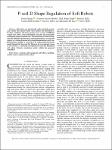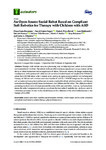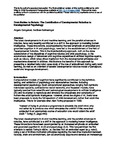P-satI-D Shape Regulation of Soft Robots
Date
2023-01Author
Subject
Metadata
Show full item recordAbstract
Soft robots are intrinsically underactuated mechanical systems that operate under uncertainties and disturbances. In these conditions, this letter proposes two versions of PID-like control laws with a saturated integral action for the particularly challenging shape regulation task. The closed-loop system is asymptotically stabilized and matched constant disturbances are rejected using a very reduced amount of system information for control implementation. Stability is assessed on the underactuated dynamic model through the Invariant Set Theorem for two relevant classes of soft robots, i.e., elastically decoupled and elastically dominated soft robots. Extensive simulation results validate the proposed controllers.
Collections
Publisher
Journal
Volume
Issue
Pagination
Recommended, similar items
The following license files are associated with this item:
Related items
Showing items related by title, author, creator and subject.
-
An Open-Source Social Robot Based on Compliant Soft Robotics for Therapy with Children with ASD
Casas-Bocanegra, D; Gomez-Vargas, D; Pinto-Bernal, MJ; Maldonado, J; Munera, M; Villa-Moreno, A; Stoelen, MF; Belpaeme, T; Cifuentes, CA (MDPI, 2020-09-20)<jats:p>Therapy with robotic tools is a promising way to help improve verbal and nonverbal communication in children. The robotic tools are able to increase aspects such as eye contact and the ability to follow instructions ... -
Developmental Robotics: From Babies to Robots
Cangelosi, A; Schlesinger, M (MIT PressCambridge, MA, 2015-01-25)Developmental robotics is a collaborative and interdisciplinary approach to robotics that is directly inspired by the developmental principles and mechanisms observed in children’s cognitive development. It builds on the ... -
From Babies to Robots: The Contribution of Developmental Robotics to Developmental Psychology
Cangelosi, A; Schlesinger, M (2018-01-01)© 2018 The Society for Research in Child Development, Inc. The latest developments in artificial intelligence (AI) and machine learning, and the parallel advances in robotics, have contributed recently to a shift in the ...




